List of amphibians and reptiles of Montserrat
This is a list of amphibians and reptiles found in the British overseas territory of Montserrat, located in the Caribbean Lesser Antilles. The continuing eruptions of the Soufrière Hills volcano have devastated much of the island.
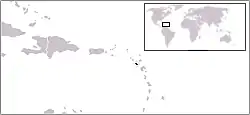
Location of Montserrat in the Caribbean
Amphibians
There are three species of amphibian on Montserrat, one of which was introduced.[1]
Frogs (Anura)
| Tropical frogs (Leptodactylidae) | |||
|---|---|---|---|
| Species | Common name(s) | Notes | Image |
| Eleutherodactylus johnstonei | Lesser Antillean whistling frog, coqui Antillano, Johnstone's whistling frog | Least concern.[2] Abundant. | 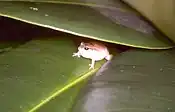 |
| Leptodactylus fallax | Giant ditch frog, mountain chicken | Critically endangered. Regional endemic; extant only on Montserrat and Dominica. Volcanic activity from the late 1990s through 2012 caused habitat destruction, coupled with the arrival of Batrachochytrium dendrobatidis in 2009, decimating the population. | 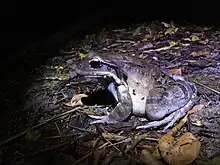 |
| True toads (Bufonidae) | |||
| Species | Common name(s) | Notes | Image |
| Bufo marinus | Cane toad, giant neotropical toad, marine toad | Least concern. Introduced. Abundant. | 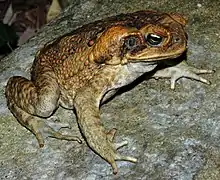 |
Reptiles
Including marine turtles and introduced species, there are 15 reptile species on Montserrat. Two are endemic: the Plymouth anole (Anolis lividus) and the Montserrat galliwasp (Diploglossus montisserrati).
Turtles (Testudines)
| Tortoises (Testudinidae) | |||
|---|---|---|---|
| Species | Common name(s) | Notes | Image |
| Geochelone carbonaria | Red-footed tortoise | 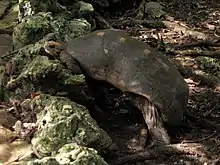 | |
| Scaly sea turtles (Cheloniidae) | |||
| Species | Common name(s) | Notes | Image |
| Caretta caretta | Loggerhead turtle | Endangered. Very rarely recorded around Montserrat. Not recorded nesting on Montserrat. | 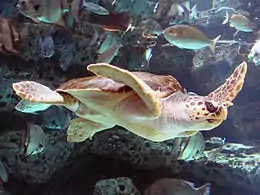 |
| Chelonia mydas | Green turtle | Endangered. Resident in waters around Montserrat. Recorded nesting. | 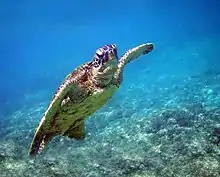 |
| Eretmochelys imbricata | Hawksbill turtle | Critically endangered. Relatively common year-round. Recorded nesting. | 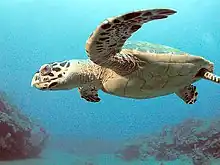 |
| Leathery sea turtles (Dermochelyidae) | |||
| Species | Common name(s) | Notes | Image |
| Dermochelys coriacea | Leatherback turtle | Critically endangered. Rarely recorded in Montserrat waters or nesting. | 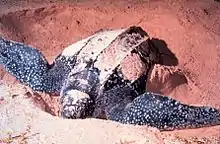 |
Lizards and snakes (Squamata)
| Geckos (Gekkonidae) | |||
|---|---|---|---|
| Species | Common name(s) | Notes | Image |
| Hemidactylus mabouia | House gecko | Introduced. | .jpg.webp) |
| Sphaerodactylus fantasticus | Fantastic least gecko | 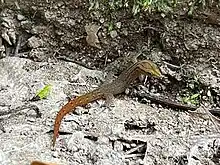 | |
| Thecadactylus rapicauda | Turnip-Tailed Gecko | ||
| Iguanas and anolids (Iguanidae) | |||
| Species | Common name(s) | Notes | Image |
| Anolis lividus | Plymouth anole | Endemic. Widespread and frequently abundant. | 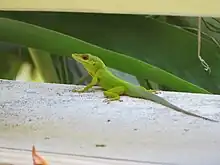 |
| Iguana iguana melanoderma | Saban black iguana | Regionally endemic to Montserrat and Saba. No current evidence of green iguana.[3] The Saban black iguana is darker coloured than the other subspecies of green iguana, with colouration deepening in older individuals. It possesses a noticeable black patch between the eye and tympanum. | 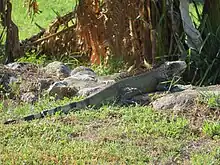 |
| Whiptails (Teiidae) | |||
| Species | Common name(s) | Notes | Image |
| Pholidoscelis pluvianotatus | Montserrat ameiva | Regional endemic. Numbers have declined significantly due to volcanic activity. | |
| Glass lizards and alligator lizards (Anguidae) | |||
| Species | Common name(s) | Notes | Image |
| Diploglossus montisserrati | Montserrat galliwasp | Critically endangered. Endemic. Known from only one specimen collected in 1964 until it was re-found in 1998. Most recently sighted in 2018. | |
| Skinks (Scincidae) | |||
| Species | Common name(s) | Notes | Image |
| Mabuya mabouya[4] | Regional endemic. Rare. | 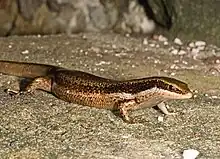 | |
| Worm snakes (Typhlopidae) | |||
| Species | Common name(s) | Notes | Image |
| Typhlops monastus | Montserrat worm snake | Regional endemic; populations found on Saint Kitts and Nevis are of subspecies T. m. geotomus. | |
| Colubrids (Colubridae) | |||
| Species | Common name(s) | Notes | Image |
| Alsophis antillensis | Antilles racer, island racer, leeward racer | Regional endemic. Widespread. | 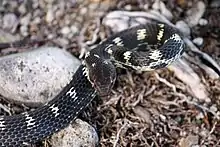 |
Notes
- Malhotra & Thorpe 1999 also includes Eleutherodactylus martinicensis in its species checklist for Montserrat, at p. 117, but this is not supported by the main text, which describes only three amphibian species for the island, nor do other sources support the presence of this species.
- Conservation status, where available, is from the IUCN Red List and is indicative of the status of the species as a whole, not just populations on Montserrat.
- "An integrative approach to assess non-native iguana presence on Saba and Montserrat: are we losing all native Iguana populations in the Lesser Antilles?". July 2022.
- Procter & Fleming 1999, p. 85. Reported in Malhotra & Thorpe 1999 as M. bistriata.
References
Note: All species listed above are supported by Malhotra & Thorpe 1999, unless otherwise cited.
- Malhotra, Anita; Thorpe, Roger S. (1999), Reptiles & Amphibians of the Eastern Caribbean, Macmillan Education Ltd., pp. 73–75, ISBN 0-333-69141-5.
- Procter, D.; Fleming, L. V., eds. (1999), Biodiversity: The UK Overseas Territories, Joint Nature Conservation Committee, pp. 82–87, ISBN 1-86107-502-2
This article is issued from Wikipedia. The text is licensed under Creative Commons - Attribution - Sharealike. Additional terms may apply for the media files.